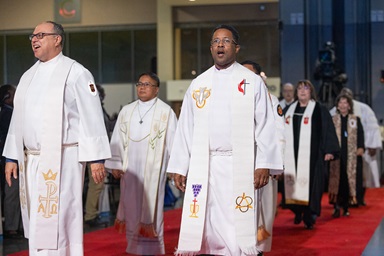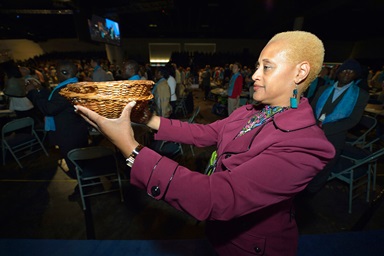While some United Methodists are protesting the 2019 General Conference at the offering plate, a Desert Southwest Conference letter asks churches to continue giving to ministry.
Bishop Robert T. Hoshibata, who leads the conference, and the Rev. Matthew Ashley, chair of the Conference Council on Finance and Administration, sent the letter April 22.
“Because of the many ways apportionments support the ministries of the Desert Southwest Conference as well as the mission of the global church, your CFA urges all of us to continue to support the apportionments,” the letter said.
The Desert Southwest missive comes less than two weeks after the neighboring California-Pacific Conference offered guidance to its churches on withholding or redirecting apportionment contributions in response to the special General Conference.
In February, the special session of the denomination’s top legislative assembly approved — by a vote of 438 to 384 — the Traditional Plan. That plan strengthens enforcement of bans on “self-avowed practicing” gay clergy and same-sex weddings.
The plan is already facing resistance from United Methodists who see the measures as discriminatory against LGBTQ churchgoers, and some closed-door conversations are under way about potentially splitting the denomination.
“Because of this deep pain and disappointment, some would like to resist the injustice of the Traditional Plan by withholding apportionments,” noted the Desert Southwest letter.
Apportionments are the share each conference or local church pays to support international, national and regional ministries. Every four years, General Conference sets the budget needed to support denomination-wide ministries. That amount is then apportioned mainly to U.S. conferences, which in turn ask for apportionments from local churches to support ministries at every level of the church.
Withholding some percentage of apportionments is not a simple fix, the letter said, “because some extraordinary ministries depend on your apportionment dollars.”
The Desert Southwest Conference Council on Finance and Administration “engaged in honest reflection about the importance of supporting the myriad of ministries that engage faith, reach out with compassion and transform lives and communities,” Hoshibata told United Methodist News Service.
“The Desert Southwest Conference is composed of persons representing the diversity of theological positions relative to human sexuality, but this conference also supports the efforts of the denomination with the heart of Jesus.”
His letter noted that 82 cents of every apportionment dollar given by a local church remains in the conference to plant new churches, fund campus ministries, ensure equitable clergy compensation and support various ministries for people on the margins.
At the general church level, the letter said, the remaining 18 cents goes to support a number of ministries that churchgoers value. These include hospitals, orphanages, schools and the Ministerial Education Fund that supports clergy education and United Methodist seminaries.
The Desert Southwest Conference has a long-standing practice of paying 100 percent of general church apportionments — paying in full the years of 1999-2007 and 2011-2018.
“We are supportive of the many great connectional ministries of our denomination,” said Randy Bowman, conference treasurer. “Also, we feel strongly that we need to model 100 percent giving for our local churches.”
Overall, conferences in the Western Jurisdiction, which encompasses 12 states and Guam in the western U.S., also have a track record of paying 100 percent apportionments. For the last two years, all of the jurisdiction's conferences, with the exception of California-Pacific, have paid the full requested amount.
However, the Desert Southwest Conference finance council plans to assess matters again in May. Part of the uncertainty is that the Judicial Council, the denomination’s top court, is reviewing the Traditional Plan’s constitutionality this week.
“Our decision could be impacted by financial considerations (the level of apportionment receipts from our local churches) as much, if not more than, the Judicial Council ruling,” Bowman said.
While Desert Southwest supports continued giving at the general church level, other conferences are taking a hard look at ways to restrict spending of their church dollars.
The California-Pacific Conference is offering its congregations ways to contribute to an alternative World Service Fund and alternative General Administration Fund. Normally, World Service funds most general agencies and General Administration funds administrative bodies, including General Conference itself.
The alternative funds, a California-Pacific Conference letter said, would be “sent on to support the General Church ministries we value only after we determine that they do not support leadership or agencies that further exclusion or judgment against LGBTQIA persons.”
The New England Conference Council on Finance and Administration has voted to continue making payments to general church ministries but not to dip into reserves to pay above what its local churches remit.
The Northern Illinois Conference CFA is proposing to annual conference voters that it stop payment to the General Administration Fund.
One issue facing the denomination is that the U.S. church pays for the bulk of global general church operations, but most U.S. General Conference delegates voted against the Traditional Plan.
General Conference votes are by secret ballot. However, supporters of various plans have agreed that two-thirds of U.S. delegates backed the rival One Church Plan that would have left gay marriage up to local churches and gay ordination up to conferences. Meanwhile, 80 percent of delegates outside the U.S. supported the Traditional Plan.
As of March 31, general church apportionment payments were down about 15.6 percent compared to the same time last year.
It’s too soon to say what that portends. Conferences have a full year to pay their requested apportionments and make payments at the rate they determine. Many factors can affect first-quarter apportionment payments, said Sharon Dean, director of communications for the denomination’s General Council on Finance and Administration.
For example, Mountain Sky Conference announced it is not paying 100 percent general church apportionments for the next six months largely to make up for a 6 percent budget shortfall last year.
Even before GC2019, the agency’s board made plans to submit a significantly reduced general church budget to the 2020 General Conference.
Moses Kumar, General Council on Finance and Administration’s top executive, said the agency recognizes many United Methodists are still processing the special General Conference.
“While we recognize that there are ongoing conversations for each individual, local church and annual conference on how to move forward, it is GCFA’s responsibility to encourage giving to the ministries that make us a global, connectional church,” he said.
“As The United Methodist Church takes the time to work through the various sides of any issue, we pray earnestly for the best solution for the denomination. The impact of our decisions is measured in lives saved, disciples made, healing taking place, and mission carried out.”
Hahn is a multimedia news reporter for United Methodist News Service. Contact her at (615) 742-5470 or [email protected]. To read more United Methodist news, subscribe to the free Daily or Weekly Digests.
Like what you're reading? Support the ministry of UM News! Your support ensures the latest denominational news, dynamic stories and informative articles will continue to connect our global community. Make a tax-deductible donation at ResourceUMC.org/GiveUMCom.




